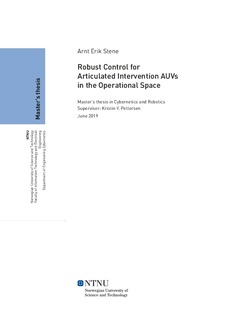Robust Control for Articulated Intervention AUVs in the Operational Space
Master thesis
Permanent lenke
http://hdl.handle.net/11250/2625664Utgivelsesdato
2019Metadata
Vis full innførselSamlinger
Sammendrag
Denne avhandlingen undersøker robuste kontrollmetoder innenfor «operational space» formuleringen. Metodene er brukt på et artikulert intervensjons undervannskjøretøy (AIAUV) som krever robust kontroll for å motvirke usikkerheter i hydrodynamiske og hydrostatiske parametere, ukjente eksterne forstyrrelser, som bølger og strømmer, og modelleringsfeil. AIAUV er en hyper-redundant robotmanipulator som har vist potensiale for kostnadsbesparende og effektiv drift i undersjøisk inspeksjon, vedlikehold og reparasjon.
Prosjektet fokuserer på «sliding mode» kontrollere (SMC), hvor en enkel PID-regulator er implementert som referanse og sammenlignet med høyere-ordens, ulineære «super-twisting» med adaptive ledd (STA) og «generalized super-twisting» (GSTA). Disse metodene inkluderer en integrator som skjuler den ikke-kontinuerlige høyfrekvente vekslingen i kontrollsignalet som er typisk for «sliding mode» kontroll og sikrer et kontinuerlig kontrollsignal.
«Operational space» formuleringen muliggjør kontroll av flere oppgaver med ulik prioritet, slik at de redundante frihetsgradene i AIAUVen kan utnyttes til å intuitivt utforme forskjellige kontrolloppgaver. Avhandlingen fokuserer på tre ulike kontrolloppgaver: Styring av slangens hodeposisjon og rotasjon; vinklene i rotasjonsleddene; og «actuation index». Sistnevnte er et resultat fra prosjektoppgaven, og blir videre brukt til å unngå singulariteter som en kontrolloppgave i simuleringer.
For å undersøke ytelsen til kontrollerne utføres en simuleringsstudie i realistiske scenarier som AIAUVen kan møte på undersjøiske installasjoner. «Sliding mode» kontrollerne presterer på samme nivå som PID-kontrolleren med kompensasjon, noe som viser at de er velegnet for robust kontroll på en AIAUV. For å konkludere, «operational space» formuleringen er velegnet til å implementere prioriteter for flere oppgaver for en AIAUV, hvor transient ytelse og stasjonær konvergens med «sliding mode» kontrollerne er vist gjennom simuleringer. I tillegg viser «actuation index» økt ytelse når avanserte «sliding mode» kontrollere brukes. This thesis examines robust control methods applied within the operational space control formulation. The methods are applied to an Articulated Intervention Autonomous Underwater Vehicle (AIAUV) which require robust control to counteract uncertainties in hydrodynamic and hydrostatic parameters, unknown external disturbances, like waves and currents, and modeling errors. The AIAUV is a hyper-redundant robot manipulator which has shown great promise for efficient and cost effective operations in subsea inspection, maintenance and repair.
The thesis is focused on sliding mode controllers (SMC), where a simple PID-controller is implemented as reference and compared to the higher order, nonlinear super-twisting algorithm with adaptive gains (STA) and the generalized-super-twisting algorithm (GSTA). These methods include an integrator which cloaks the non-continuous high-frequency switching of the sliding mode control approach and ensures a continuous control signal.
The operational space formulation incorporates multiple task-priority control, which allows exploitation of the redundant degrees of freedom of the AIAUV for intuitive design of different control tasks. The thesis tackles different control tasks, namely end-effector position and orientation; joint angles; and the actuation index. The latter is a result of the specialization project and is further examined for actuator singularity avoidance in this thesis.
A simulation study is performed in realistic scenarios which the AIAUV might face at subsea. The SMCs perform on par with the PID-controller with compensation, proving they are well suited robust controllers for the AIAUV. In conclusion, the operational space formulation is well suited to implement task priorities for the AIAUV, where transient performance and stationary convergence with the robust controllers is shown through simulations. Finally, the actuation index task displays increased performance with the more advanced controllers.
